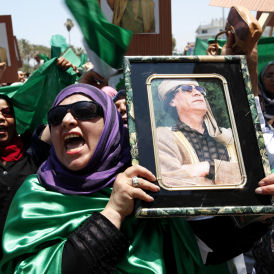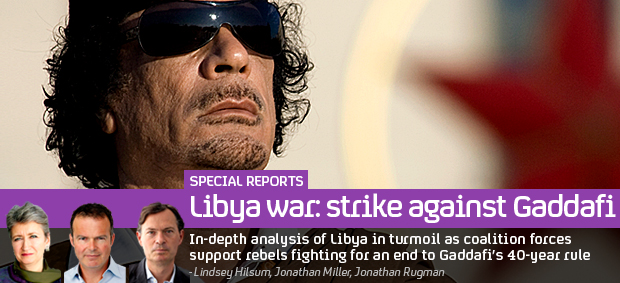Arrest warrant issued for Gaddafi
The International Criminal Court issues an arrest warrant for Libyan leader Muammar Gaddafi. But whether he will face justice or not still hangs in the balance, a lawyer tells Channel 4 News.

The court has issued arrest warrants for Gaddafi, his son Saif al-Islam and his brother-in-law and intelligence chief Abdullah al-Senussi.
Foreign Secretary William Hague said: “These individuals are accused of crimes against humanity and should be held to account before judges in a criminal court. The warrants further demonstrate why Gaddafi has lost all legitimacy and why he should go immediately.”
The ICC said Gaddafi was wanted for orchestrating the killing, injuring, arrest and imprisonment of hundreds of civilians during the first 12 days of an uprising against his rule in Libya. The Hague-based court said he also tried to cover up the alleged crimes.
The head of the International Bar Association, Mark Ellis, told Channel 4 News it was a signal that impunity would not be acceptable for Gaddafi – but it was still “doubtful” that he would face justice soon.
“Any attempts to cut a deal or find a safe haven for Gaddafi are now much more difficult to support in light of the ICC arrest warrant,” he said.
“But whether we see Gaddafi in The Hague any time soon is doubtful, unless there is a real international and political will to make that happen.”
Whether we see Gaddafi in The Hague any time soon is doubtful. Lawyer Mark Ellis
He said the example of Sudan’s President Omar al-Bashir showed that Gaddafi could cling on. The ICC issued a warrant for al-Bashir’s arrest over two years ago for charges of war crimes and crimes against humanity in Darfur but he remains in power.
“Any state which is a member of the ICC has the obligation to arrest al-Bashir. But if not, there’s no responsibility. This is the same for Gaddafi – allowing loopholes to exist. So the international community will have to speak out very strongly that all states should work to bring Gaddafi to justice.
“If the international community allows Gaddafi to be given impunity, after the ICC has said it has evidence of these crimes against humanity, well in a way the ICC doesn’t have any justification to exist. This will be a real test.”
Pressure inside Libya
The arrest warrant has been issued as pressure on Gaddafi from within Libya appears to be increasing. Rebels have made their biggest military breakthrough in recent weeks, moving to within 50 miles of the Colonel’s stronghold of Tripoli.
A rebel spokesman told Reuters that they were fighting pro-Gaddafi forces for control of the town of Bir al-Ghanem, south-west of Tripoli.
Juma Ibrahim, speaking from nearby Zintan, said: “We are on the southern and western outskirts of Bir al-Ghanem. There were battles there most of yesterday.”
Mr Ellis said the only legitimate way Gaddafi could be transferred to The Hague, in the short term, was if he was captured by rebels – a scenario which remains remote despite military gains.
The arrest warrant dramatically narrows Gaddafi’s diplomatic options, but reports from Tunisia suggested that some in his circle had not given up this strategy.
Three Libyan ministers, including the Foreign Minister, are reportedly holding talks with “foreign parties” in Tunisia.
The talks, reported by the Tunisian state news agency, could be a sign that some people close to the Libyan leader are seeking a settlement. The country has fallen into a state of civil war after vicious crackdowns on protests inspired by the Arab Spring. It is now 100 days since Nato intervened in the conflict, conducting air strikes to protect civilians from Gaddafi’s forces.
